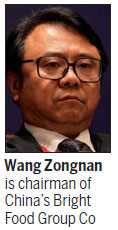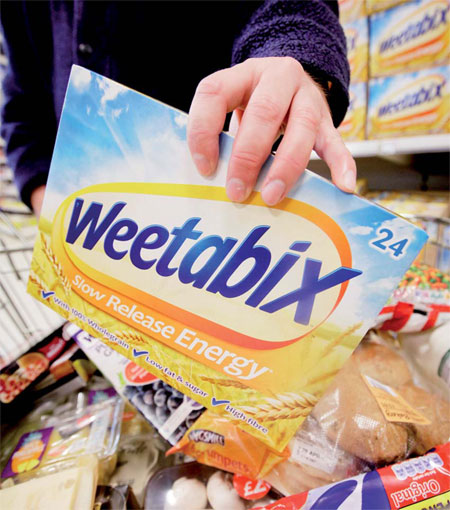Crunch cereal deal
Updated: 2012-11-16 11:23
By Zhang Chunyan (China Daily)
|
|||||||||||
|
A customer places a packet of Weetabix breakfast cereal into a shopping cart at a supermarket in Slough, UK. Bright Food Group Co Ltd, China's second-largest food company, has completed its purchase of a majority stake in Weetabix Food Co. Jason Alden / Bloomberg via Getty Images |
Chinese firm buys breakfast favorite to lead way in food fusion investment
This month, with the gobbling up of Britain's iconic Weetabix brand, Chinese food companies can be said to have planted their feet under the dinner table of the international market.
But as they seek more foreign acquisitions and develop overseas markets, it remains to be seen whether they can succeed in changing the eating habits of their own nation - starting with breakfast.
China's Bright Food Group Co Ltd has just completed its purchase of a majority stake in breakfast cereal makers Weetabix Food Co, the largest overseas acquisition a Chinese company has made in the food industry.
Bright Food paid nearly 700 million pounds ($1.12 billion, 876 million euros) to acquire a 60 percent stake and has agreed to cover 500 million pounds of Weetabix's debt.

The remaining 40 percent of shares continue to be held by the private equity group Lion Capital Management Group.
"The completion of the acquisition is the most important and most exciting moment for me, and for Bright Food," says Wang Zongnan, chairman of Bright Food.
"Weetabix is a famous international brand, so the acquisition signals Bright Food's entry into both the United Kingdom and global food markets."
Besides Weetabix, the 80-year-old breakfast cereal company also owns the brands Ready Brek and Alpen.
Bright Food aims to sell the products in China and other parts of Asia, using its existing distribution channels and experience.
Some experts note the acquisition shows Bright Food's confidence in the market prospects for China.
"The Weetabix brand will have access to all of Bright Food's distribution channels, including our more than 100,000 retail outlets, which will allow it to be brought to Chinese households more quickly," Wang says.
Bright Food, however, "will make some changes or adjustments to suit Chinese people's tastes".
"Weetabix has a high-quality portfolio of brands, the best production standards in its class and an excellent track record of innovation," Wang adds. "The biggest difficulty is finding a way to change the Chinese people's breakfast habits."
Chinese consumers prefer hot and traditional meals in the morning. Many are also in the habit of buying rice porridge or deep-fried dough from street vendors.
Industry analysts say Bright Food will find it difficult to sell the well-known cereal brand in China.
But, Wang says: "China has a population of 1.3 billion, and people are gradually changing their consumption habits."
Breakfast cereals will add one more healthy and nutritional option for breakfast, he adds, confident that Weetabix will sell better in China than other types of cereal.
China's cereal market has been growing as more people gain an appetite for healthy packaged and convenience food.
According to the research company Euromonitor International Ltd, sales in China's breakfast cereal market reached $191 million (149 million euros) in 2011 following double-digit increases over several years. This year, it is expected to increase by 12.5 percent.
The Weetabix deal caps two years of overseas expansion by the company with mixed results.
In October 2010, Bright Dairy, Bright Food's subsidiary, spent 382 million yuan ($61 million; 48 million euros) for a 51 percent share of the New Zealand milk powder producer Synlait Milk Ltd. In August last year, Bright Dairy bought a 75 percent stake in the Australian company Manassen Foods.
Bright Food is one of the largest Chinese conglomerates in the food industry, with operations throughout the entire food industrial chain, including in agriculture, food processing and brand agency service. In 2011, Bright Food had revenues of $12.2 billion.
According to Investment and Forecast Report on the China Food Industry 2012-16 by China Investment Consulting, most of China's food industry giants have established an international development strategy, and the number of overseas mergers will increase.
Other companies such as China National Cereals Oils and Foodstuffs (COFCO) are also targeting foreign food brands.
Last year, COFCO completed a deal with Mackay Sugar that will give it a controlling stake in Tully Sugar, one of Australia's largest sugar mills. The total value of the acquisition came to 938 million yuan.
The deal is expected to lower the cost of China's sugar imports, which have been growing dramatically in recent years.
Insiders believe that Chinese food companies can obtain resources upstream in the industry chain through acquisition of foreign companies.
And, in turn, advanced foreign technology and international business experience can help Chinese companies win the trust of international markets and domestic consumers.
However, there's no recipe for success and food mergers have proved difficult. Before Weetabix, Bright Food made a series of forays into the overseas brands market.
Plans to buy British snacks maker United Biscuits from Blackstone Group and PAI Partners fell apart at the end of 2010. Also the same year, Bright Food turned its interest to US nutritional supplement retailer GNC Holdings, but in vain.
Bright Foods also lost a bid in 2011 to General Mills to buy 50 percent of French yogurt maker Yoplait.
"Sometimes, we discover risk factors when talking with foreign companies. If we find the risk cannot be controlled, we give up," Wang says.
Financing is one of main difficulties Chinese food companies face in overseas M&A bids.
Bright Food's acquisition of Weetabix owes much to its financing strategy, when it borrowed from both Chinese and foreign banks. It adopted a "club financing" approach, giving equal participation status to each bank, which significantly reduced lending rates.
China Development Bank, Bank of China, Bank of Communications and foreign lenders including Royal Bank of Scotland, Barclays and HSBC were involved.
"The participation of financial institutions can enhance expectations for the acquisition's success, which can be much more important than just the capital they provide," Zhang Huiming, head of the Enterprise Research Center at Fudan University, told Xinhua News Agency.
Financial institutions provide external risk evaluations, Zhang said, and their diversified judgments make the evaluations more scientific.
The state-owned status of some Chinese food companies and crises in trust among consumers in China also hamper overseas expansion.
Then, following acquisition, ensuring everything runs smoothly in the mix of Chinese and Western cultures is a major concern.
Wang says Bright Food will show trust and respect toward the Weetabix workforce. "We won't lay off employees after the transaction," he says.
Bright Food and Weetabix both have their own ways of doing business, Wang says. "We are faced with some difficulties," he adds. Even so, "we will try our best to accomplish our goals in accordance with our strategy".
Giles Turrell, Weetabix CEO, welcomes the deal. "We are delighted about our partnership with Bright Food," he says. "We are confident that, with Bright Food's support, we will be able to significantly strengthen our market position and expand our business internationally."
The Weetabix brand is based in Northamptonshire, England, and has been manufactured and sold in Britain since 1932.
Lyndon Lea, a partner in Lion Capital, says: "Under Lion's ownership, Weetabix has achieved strong top and bottom-line performance and expanded its share of the UK cereal market. We believe it has tremendous further potential, and Bright is well-positioned to support the company's continued success both abroad and within our core British market."
zhangchunyan@chinadaily.com.cn
(China Daily 11/16/2012 page20)
Today's Top News
Rescuers race against time for quake victims
Telecom workers restore links
Coal mine blast kills 18 in Jilin
Intl scholarship puts China on the map
More bird flu patients discharged
Gold loses sheen, but still a safe bet
US 'turns blind eye to human rights'
Telecom workers restore links
Hot Topics
Lunar probe , China growth forecasts, Emission rules get tougher, China seen through 'colored lens', International board,
Editor's Picks

|

|

|

|

|

|






